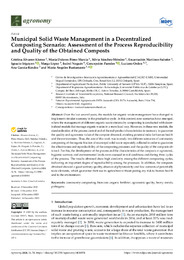Título :
Municipal Solid Waste Management in a Decentralized Composting Scenario: Assessment of the Process Reproducibility and Quality of the Obtained Composts |
Autor :
Pérez Murcia, Mª Dolores 
Álvarez Alonso, Cristina
Sánchez Méndez, Silvia
Martínez Sabater, Encarnación 
irigoyen, ignacio 
López, Marga
Nogués, Isabel
Paredes, Concepcion 
Orden, Luciano 
García Rández, Ana
Bustamante, Maria Angeles  |
Editor :
MDPI |
Departamento:
Departamentos de la UMH::Agroquímica y Medio Ambiente |
Fecha de publicación:
2023-12 |
URI :
https://hdl.handle.net/11000/34190 |
Resumen :
Over the last several years, the models for organic waste management have changed to
implement circular economy in the productive cycle. In this context, new scenarios have emerged,
where the management of different organic waste streams by composting is conducted with decentralized
models that manage organic wastes in a more local way. However, in these new models, the
standardization of the process control and of the end-product characteristics is necessary to guarantee
the quality and agronomic value of the compost obtained, avoiding potential risks for human health
and the environment. Thus, the aim of this work was to study two different scenarios of community
composting of the organic fraction of municipal solid waste separately collected in order to guarantee
the effectiveness and reproducibility of the composting processes and the quality of the composts obtained.
For this, the development of the process and the characteristics of the composts at agronomic,
hygienic–sanitary and environmental levels were assessed in real conditions and during three cycles
of the process. The results obtained show high similarity among the different composting cycles,
indicating an important degree of reproducibility among the processes. In addition, the composts
obtained showed a good sanitary quality, absence of phytotoxicity and low contents of potentially
toxic elements, which guarantee their use in agriculture without posing any risk to human health
and to the environment.
|
Palabras clave/Materias:
community composting
biowaste
organic fertilizer
agronomic quality
heavy metals
pathogens |
Tipo de documento :
info:eu-repo/semantics/article |
Derechos de acceso:
info:eu-repo/semantics/openAccess
Attribution-NonCommercial-NoDerivatives 4.0 Internacional |
DOI :
https://doi.org/10.3390/agronomy14010054 |
Publicado en:
Agronomy 2024, 14, 54 |
Aparece en las colecciones:
Artículos Agroquímica y Medio Ambiente
|
 La licencia se describe como: Atribución-NonComercial-NoDerivada 4.0 Internacional.
La licencia se describe como: Atribución-NonComercial-NoDerivada 4.0 Internacional.
.png)
